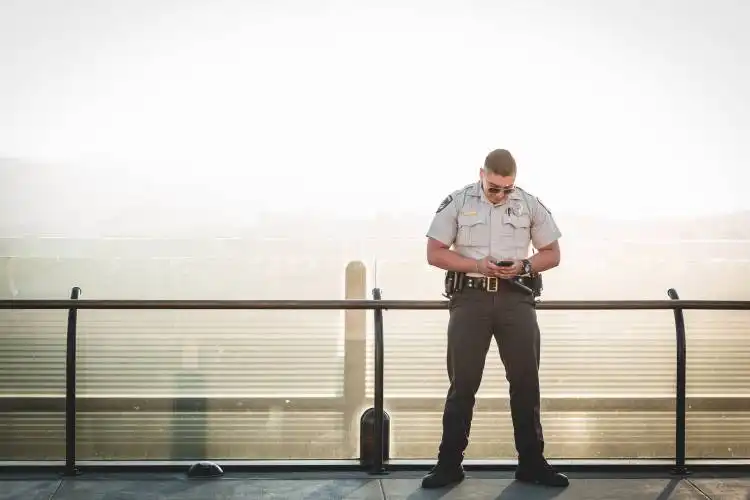Start a Bounty Hunter Business
Unleashing Your Inner Action Hero: The Thrilling Ride of a Bounty Hunter Business
| Updated


BOUNTY HUNTER BUSINESS
If you've ever visualized yourself in a thrilling chase, then starting a Bounty Hunter Business may be your calling. This adrenaline-inducing venture is heavy on the pursuit and capture of fugitives who've skipped out on their bail, blending the excitement of detective work with the satisfaction of seeing justice served. But remember, it's not all sunglasses and slick getaways; you'll need a sharp intellect, a knack for negotiation, and the legal know-how to navigate the fine print of the law. So it’s time to buckle up for an adventurous career that combines action, strategy, and potentially rewarding paydays!
Jump to Business Plan
RELATED BUSINESS IDEAS
Browse ALL Business Solutions & Consulting Business Ideas
Discover Your Perfect Domain
Unlock the door to your online success with our hand-picked selection of premium domain names. Whether you're starting a new venture or rebranding an existing one, the right domain can set the tone for your digital presence. Browse through our curated list, each with its unique potential to enhance your brand's visibility and credibility.
BOUNTY HUNTER MINI BUSINESS PLAN
This a quick reality check to help you identify the strengths and weaknesses of your business concept before you dive in.
Expected Percent Margins:
- Gross Margin: 60-80%
- Net Profit Margin: 30-40%
Earnings Expectations:
- Daily Earnings: $200 - $400
- Weekly Earnings: $1,000 - $2,000
- Monthly Earnings: $4,000 - $8,000
- Annual Earnings: $48,000 - $96,000
Actions to Hit Those Numbers:
Skills and Training:
- Bounty Hunter Training: Complete prerequisite training programs from reputed institutions.
- Legal Understanding: Acquaint yourself with state laws and regulations concerning bounty hunting.
Capture Strategy:
- Research: Invest sufficient time gathering information about your fugitive.
- Planning: Sketch a fail-safe plan to catch your subject.
Safety Measures:
- Equipment: Invest in necessary safety gear and equipment.
- Backup: Maintain contacts with local law enforcement or backup personnel.
Marketing and Networking:
- Bail Bondsman Network: Establish strong relationships with local bail bondsman. These are your primary clients.
- Online Presence: Create a professional website and social media accounts. They act as a marketing tool and offer credibility.
Legal and Insurance:
- Legal Coverage: Get insured for possible damages or lawsuits. Budget around $500 - $1,000 annually.
- Licenses: Ensure you have all necessary licenses. These fees vary by state.
Cost Control:
- Vehicle: A reliable vehicle is an essential investment. Consider the cost of running, maintaining and insuring your vehicle.
Business Operations:
- Cases: Handle 1-4 cases at a time depending on complexity. Keep in mind the quality of work over quantity.
- Client Relations: Maintain good relationships with clients (bail bondsman, law enforcement, etc.).
These are generalized estimations and can vary greatly based on multitude of factors including state, number of bail skips, and ability to safely and effectively capture fugitives. Always consult with a financial advisor and local law enforcement agencies before starting this type of business.
NOT WHAT YOU HAD IN MIND? Here are more ideas



Browse ALL Business Solutions & Consulting Business Ideas
Grab Your Business Website Name
Before you get caught up in the whirlwind of setting up your business, invest in a domain name. It's a small but significant step that lays the foundation for your brand and makes it easier for customers to find and trust you. Just like you wouldn't build a house without securing the land first, don't build a business without securing your domain name.
"Why? Can't that wait?" Here's why it shouldn't
Step 1: Determine if Bounty Hunting is the Right Endeavor
Breakdown of Startup Expenses
Before starting a bounty hunting business, it is important to understand the costs associated with starting the business. These costs can include licensing fees, insurance, training, and equipment. Licensing fees vary by state, so it is important to research the specific requirements in the area where the business will be located. Insurance is necessary to protect the bounty hunter and the business from potential liabilities. Training may be necessary to become certified in the state where the business will be located. Finally, equipment such as handcuffs, protective gear, and weapons may be necessary.
Breakdown of Ongoing Expenses
After the initial startup costs, there are ongoing expenses associated with running a bounty hunting business. These expenses can include advertising, transportation, and legal fees. Advertising is necessary to attract new clients and build a customer base. Transportation costs can include gas, car maintenance, and other related costs. Legal fees may be necessary to file paperwork and represent the bounty hunter in court.
Examples of Ways to Make Money
Bounty hunters can make money in a variety of ways. They can charge a fee for tracking down fugitives, collect a percentage of the bail bond, or receive a reward for the capture of a fugitive. Bounty hunters can also charge a fee for providing security services or for providing investigative services. Finally, bounty hunters can also charge a fee for providing consultation services to law enforcement agencies.
Step 2: Name the Business
When naming your bounty hunter business, it is important to consider the type of services you will be offering and the area in which you will be operating. You should also consider the potential customer base you will be targeting. Additionally, you should make sure that the name is easy to remember and spell. It should also be unique and reflect the services you will be offering. You may want to consider using a combination of words that are related to bounty hunting, such as “Bounty Hunter Services” or “Bounty Hunter Solutions”. You should also consider using a play on words, such as “Bounty Hunter 4U” or “Bounty Hunter Pro”. Additionally, you should make sure that the name is not already taken by another business. You can easily check this by searching for the name on the internet or by checking with your local business bureau. Once you have chosen a name, you should register it with the appropriate authorities and obtain any necessary licenses or permits.
Step 3: Obtain Necessary Licenses and Permits
In order to become a bounty hunter, you will need to obtain the necessary licenses and permits. Depending on the state, these requirements may vary. Generally, you will need to submit an application to the local law enforcement agency and provide proof of identity, residency, and a criminal background check. You may also need to take a class or pass a test in order to obtain the license. Additionally, you may need to provide proof of insurance and a surety bond.
Cost of Licensing
The cost of licensing can vary depending on the state and the type of license you are applying for. Generally, the cost of obtaining a license can range from a few hundred dollars to a few thousand dollars. Additionally, you may need to pay for the cost of the class or test, as well as the cost of the surety bond.
Renewal of Licenses
In most states, the license will need to be renewed every year or two. The cost of renewal will depend on the state and the type of license you are renewing. Generally, the cost of renewal will be lower than the cost of obtaining the license initially. Additionally, you may need to take a class or pass a test in order to renew the license.
Benefits of Licensing
Having a license will allow you to legally operate as a bounty hunter. Additionally, having a license will give you access to resources and information that can help you in your business. It will also give you credibility with potential clients and law enforcement agencies.
Step 4: Establish a Business Plan
When creating a business plan, it is important to include the following components:
- Executive Summary: This is a brief overview of the business, its goals, and the strategies you plan to use to achieve them.
- Business Description: This section should include a description of the business, its products or services, and the target market.
- Market Analysis: This section should include an analysis of the current market, potential competitors, and any potential opportunities or threats.
- Financial Plan: This section should include a breakdown of startup expenses, ongoing expenses, and potential sources of income.
Once the components of the business plan have been identified, it is important to create a detailed plan that outlines the steps needed to achieve the business’s goals. This plan should include a timeline, a budget, and a list of tasks that need to be completed. Additionally, it is important to include a section on marketing and promotion, as this is a key factor in the success of any business. Finally, the business plan should be reviewed and revised regularly to ensure that it is up-to-date and accurate.
Step 5: Secure Financing
Securing financing is a crucial step in starting a bounty hunter business. There are a variety of sources of financing available, including personal savings, loans from family and friends, and traditional bank loans. Additionally, there are a variety of government grants and loans available for small businesses. It is important to research all of the available options and determine which one is the best fit for the business.
Consider a Business Partner
Another option for financing a bounty hunter business is to consider a business partner. This can be a great way to share the financial burden of starting a business and to gain access to additional resources. When considering a business partner, it is important to make sure that the partner shares the same vision and goals for the business. It is also important to create a written agreement that outlines the responsibilities and expectations of each partner.
Create a Budget
Once the financing has been secured, it is important to create a budget. This budget should include all of the startup and ongoing expenses associated with the bounty hunter business. This includes the cost of equipment, licensing fees, insurance, and any other expenses associated with running the business. It is important to be realistic and to create a budget that is realistic and achievable.
Establish a Credit Line
Finally, it is important to establish a credit line for the business. This will provide access to additional funds if needed and will help to ensure that the business has the resources it needs to succeed. It is important to research the different options available and to select the one that best meets the needs of the business.
Step 6: Set Up Business Operations
Establishing a Business Location
When setting up a business location for a bounty hunter business, it is important to consider the local laws and regulations. Depending on the state, there may be restrictions on where bounty hunters can operate. Additionally, it is important to consider the cost of rent and utilities when selecting a business location. It is also important to consider the safety of the location and the convenience for clients.
Purchasing Equipment
When starting a bounty hunter business, it is important to purchase the necessary equipment. This includes items such as handcuffs, firearms, body armor, and vehicles. It is important to research the best options for each item, as well as the cost. Additionally, it is important to consider the safety of the equipment and the reliability of the items. It is also important to consider the cost of maintenance and repairs. Finally, it is important to consider the cost of insurance for the equipment.
Step 7: Market the Business
Advertising your bounty hunter business is essential to get the word out and attract clients. You should consider a combination of online and offline strategies. Online strategies include creating a website, optimizing it for search engines, and using social media platforms to reach potential clients. Offline strategies include distributing flyers and brochures, attending local events, and networking with other professionals in the industry.
Networking
Networking is an important part of marketing your bounty hunter business. You should reach out to other professionals in the industry, such as bail bondsmen, attorneys, and law enforcement officials. These professionals can provide referrals and help you build relationships with potential clients. Additionally, you should attend industry events and conferences to meet other professionals and learn about the latest trends in the industry.
Branding
Creating a strong brand identity is essential for your bounty hunter business. You should create a logo and tagline that represent your business and its values. Additionally, you should create a website and social media accounts that feature your logo and tagline. You should also use consistent branding across all of your marketing materials, such as flyers, brochures, and business cards.
Pricing Strategies
When pricing your services, you should consider the local market and the competition. You should also consider the cost of your services, such as fuel, equipment, and other expenses. Additionally, you should consider the value of your services and the potential return on investment for your clients. You should also consider offering discounts and promotions to attract new clients.
Step 8: Network with Other Bounty Hunters
Networking with other bounty hunters can be beneficial in many ways. It can help you stay up to date on the latest trends in the industry, as well as provide you with valuable advice and resources. Additionally, networking with other bounty hunters can help you make connections with potential clients and other professionals in the industry.
How to Network
Networking with other bounty hunters can be done in a variety of ways. Attending industry conferences and seminars is a great way to meet other bounty hunters and learn more about the industry. Additionally, joining online forums and social media groups can be a great way to connect with other bounty hunters and discuss industry topics. Finally, attending local events and meetings can be a great way to meet other bounty hunters in your area.
Networking Tips
When networking with other bounty hunters, it is important to be professional and courteous. Additionally, it is important to be open to learning and be willing to share your own experiences and knowledge. Additionally, it is important to be respectful of other bounty hunters and their opinions. Finally, it is important to remember that networking is a two-way street, so be sure to give back and help out other bounty hunters when you can.
Step 9: Stay Up to Date on Laws and Regulations
Staying informed on the laws and regulations of bounty hunting is essential to running a successful business. It is important to stay up to date on the laws in your state and any other states you may be working in. There are several resources available to help you stay informed.
The first resource is the American Association of Professional Bail Agents (AAPBA). This organization provides information on the laws and regulations of bounty hunting in each state. They also provide resources on how to become a licensed bounty hunter.
Another resource is the National Association of Fugitive Recovery Agents (NAFRA). This organization provides information on the laws and regulations of bounty hunting in each state. They also provide resources on how to become a licensed bounty hunter.
The third resource is the National Institute of Bail Enforcement (NIBE). This organization provides information on the laws and regulations of bounty hunting in each state. They also provide resources on how to become a licensed bounty hunter.
Finally, the National Association of Professional Bail Agents (NAPBA) provides resources on the laws and regulations of bounty hunting in each state. They also provide resources on how to become a licensed bounty hunter.
It is important to stay up to date on the laws and regulations of bounty hunting in each state. Staying informed will help you run a successful business and stay in compliance with the law. Utilizing the resources provided by the AAPBA, NAFRA, NIBE, and NAPBA will help you stay informed.
EXPLORE MORE CATEGORIES
Browse ALL Business Idea Categories
TAKE THE NEXT STEPS









